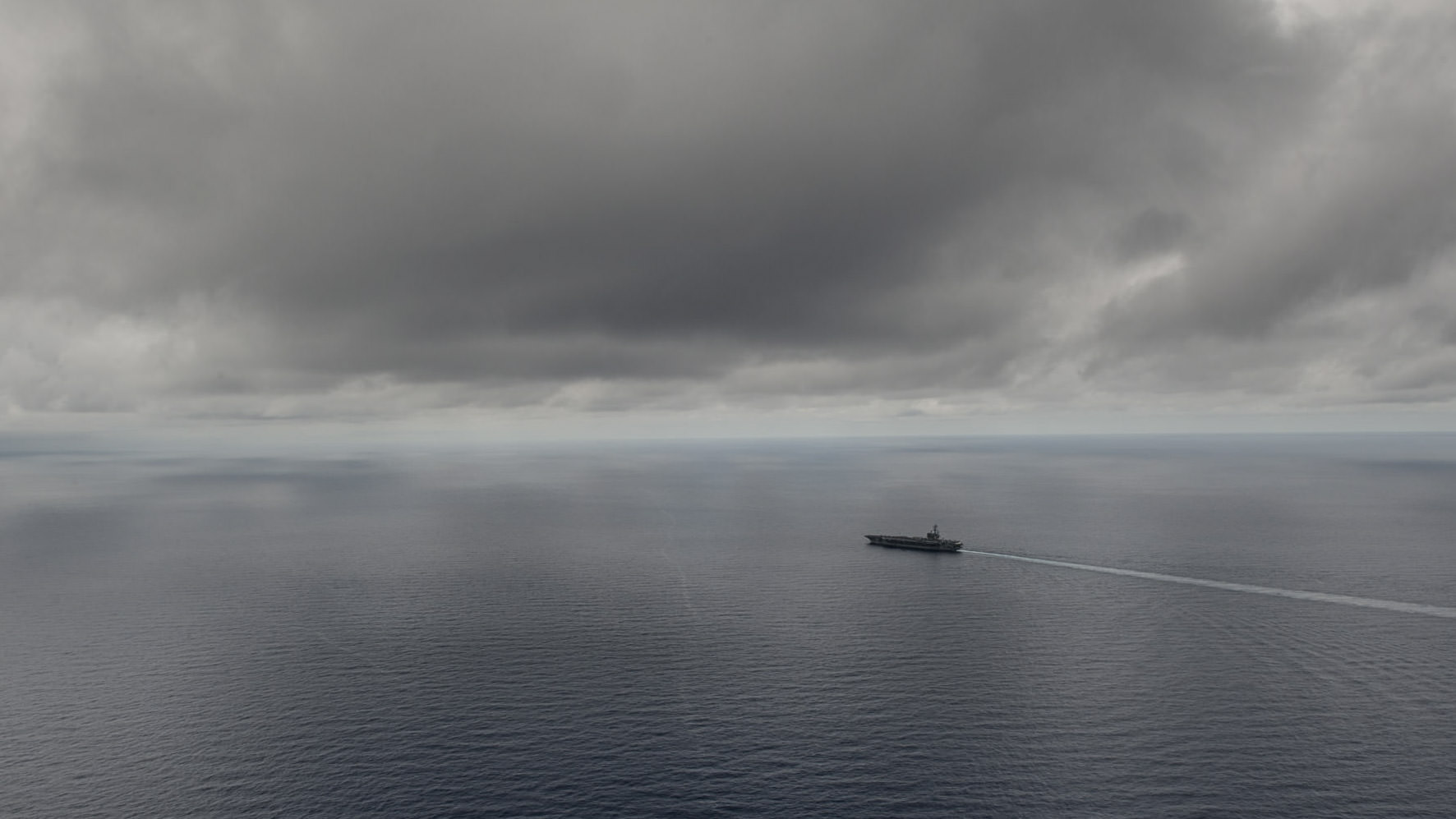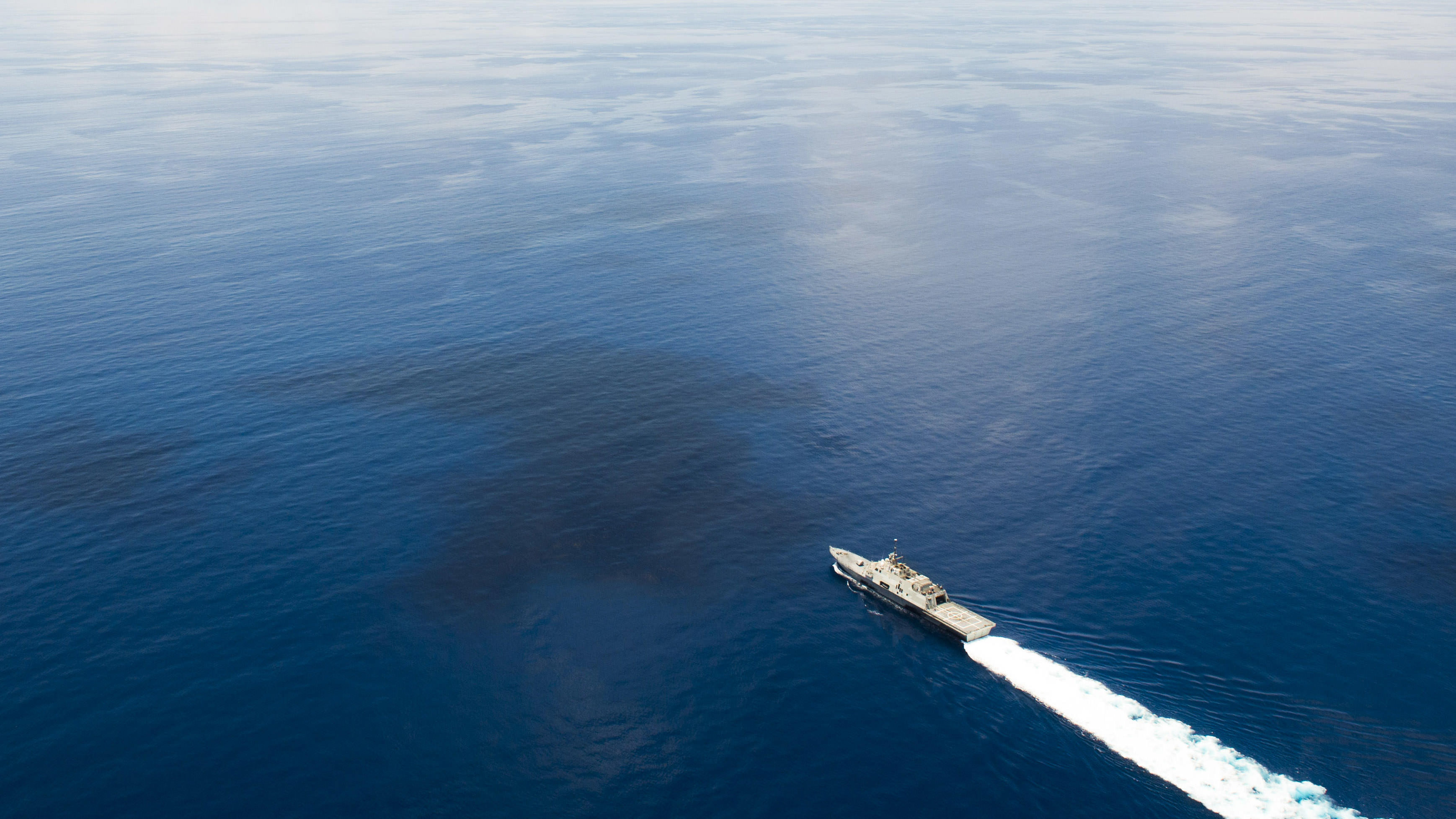Schoolyard politics on a global scale
Why the dispute over the South China Sea has been brewing for decades
August 8, 2016
The world watches closely as international tribunal rules on the South China Sea
Late in 2015, Professor Clive Schofield stood in the Great Hall of the Peace Palace in The Hague providing testimony on one of the most significant international law of the sea cases in decades.
The hearing, before an Arbitration Tribunal constituted under the United Nations Convention on the Law of the Sea (UNCLOS), was held at the Permanent Court of Arbitration in the Netherlands and was set to rule on maritime disputes in the South China Sea that have been brewing for decades.
Professor Schofield, appearing as an independent expert witness in the case between The Republic of the Philippines and The People's Republic of China, knew the stakes were high. His testimony had the potential to influence the nature of maritime claims and conflicts for generations to come.
The daunting setting was not lost on Professor Schofield, Director of Research at UOW's Australian National Centre for Ocean Resources and Security (ANCORS) and one of only two academics in the world asked to serve as independent expert witnesses in the case. It was a professional highlight, culminating when, in July, the court ruled against China in what Professor Schofield calls a "sweeping decision" that has reverberated internationally for both the content of the case and its implications for all coastal states.
The Tribunal ruled that none of the hotly contested Spratly Islands are entitled to the 200-mile Exclusive Economic Zone that China was attempting to claim. Moreover, the Tribunal found China has caused severe harm to the coral reef environment and violated its obligation to preserve and protect the marine environment through its recent large-scale land reclamation and artificial island building efforts.
It was an emphatic ruling for the Philippines, yet China's refusal to acknowledge the decision ensures the region will remain a flashpoint for the foreseeable future. The South China Sea remains firmly in the foreground, but on a macro level, the case captures a greater story: the intrigues and interests of geopolitics on the water.
The ocean comprises more than 70 per cent of planet earth. Yet our understanding and awareness of this vast environment rarely stretches beyond our immediate shores. The ocean's endless expanse teems with life, energy, and power.

The USS Ronald Reagan transits the South China Sea on July 5, 2016. Photo credit: US Navy/Flickr
It is the home of pirates and seafarers, of miniscule islands and a multitude of reefs, of countless creatures, many of which have yet to be discovered, lurking deeper than we can comprehend. And, as the South China Sea dispute confirms, the debate over which nation can lay claim to which spoils is far from solved, with international manoeuvrings the result of an environment that, due to its sheer size and bounty of resources, cannot be neatly divided.
In order to understand the political machinations that take place on our waters, and how the South China Sea became the latest battleground for ocean sovereignty, Professor Schofield says we must first understand the law of the sea.
UNCLOS, which was born out of the Third United Nations Law of the Sea Conference, took nine years to negotiate, finally concluding in 1982. The timeframe reflects the depth of its contents and the high stakes for the nations involved. While it was opened for signature on December 10, 1982, in Montego Bay, Jamaica, it only came into force 12 years later, on November 16, 1994. Known as "The Constitution for the Oceans", UNCLOS governs all activities offshore, from maritime rights to the division of resources.
"It is a remarkable document," Professor Schofield says as he flicks through a well-worn copy of the Convention in his office at ANCORS. "I find it incredible that you could put over 100 states in a room, and even though it took the best part of a decade of often contentious and painstaking negotiations, they came out with a consensus document."
For the first time, UNCLOS set out what claims coastal states could make in regards to territorial waters and their pertaining resources. Each coastal state is entitled to territorial waters that stretch 12 nautical miles offshore, and an Exclusive Economic Zone (EEZ), an area in which countries can claim exclusive rights to economic activities such as fishing and drilling, out to 200 nautical miles.
Prior to this, nations generally only claimed jurisdiction over a narrow belt of sea surrounding their coastlines, a practice that dated to the 17th century. Additionally, since the end of the Second World War and advances in drilling technology, countries increasingly claimed rights over seabed areas in order to access oil and gas deposits. The limits of such claims seawards remained uncertain however, leading to concerns over a free for all when it came to waters further offshore.
Exploitation of the ocean's resources was rife, particularly when it came to large-scale fishing operations and mining resources, such as oil and minerals. In a sense, the ocean was free to all and belonged to none.

Professor Clive Schofield at Peace Palace at The Hague for the international tribunal.
Professor Schofield said 165 states, plus the European Union, have become parties to the Convention, illustrating its near universal acceptance. But there is one notable exception: the United States. However, despite its abstention, the US is happy to act as the moral gatekeeper for the rest of the world, adhering closely to the law of the sea and not hesitating to blow the whistle on nations that don't fall into line.
"The United States has its own peculiar domestic reasons for not becoming a party to the Convention," Professor Schofield says, citing a gridlocked Congress and Senate as chief among them. "However, it made a significant contribution to the drafting of the Convention, conducts its own oceans policy strictly in keeping with it and, ironically, is arguably the greatest defender of the law of the sea. Indeed, the US has no hesitation in calling out other states when they contravene the law. Or at least the US interpretation of it."
In his role at ANCORS, Australia's only interdisciplinary, university-based centre dedicated to ocean law, Professor Schofield is at the forefront of the geographical and legal issues that play out across the world's waters. A geographer who discovered his passion for the sea while studying for his undergraduate degree at one of the United Kingdom's strongest departments of geography at the University of Durham, he paired this with an international law Masters from the University of British Columbia. He combines these disciplines in what he terms a "geo-legal" approach to his research.
Professor Schofield is brimming with anecdotes that capture the tension between the theory and reality of the law of the sea, and how this plays out on an international stage. He paints a fascinating scene that illustrates the triumphs and tribulations of maritime diplomacy.

The USS Fort Worth conducts routine patrols in international waters of the South China Sea near the Spratly Islands last year. Photo credit: US Navy/Flickr
The passive aggressive antics that occur when two friendly nations disagree, such as Canada graciously granting the United States permission to enter what they consider to be their waters, weeks after the United States had done so without requesting such authorisation; the world's superpowers refusing the play nice when the terms aren't to their liking, taking their figurative bat and ball home; and the tiny islands, like those dotted throughout the Pacific, collectively fighting to be recognised as 'large ocean states' in a David and Goliath-style battle with the mighty nations of the world.
It is schoolyard politics on a global scale, a unique insight into the literal and figurative manoeuvrings that occur on the deep blue from a man who has devoted his career to understanding how law and order applies to our oceans.
It is clear that Professor Schofield, who spent more than a decade working with the International Boundaries Research Unit at the University of Durham and graduated with a PhD in maritime boundary delimitation practice in South East Asia from the same institution, relishes his subject. His office at UOW's Innovation Campus is covered with maritime-themed maps and nautical charts, to which he frequently refers when discussing the minutiae of a nation's boundary or the finer points of the EEZ.
For Professor Schofield, the South China Sea has crystallised key issues at the heart of UNCLOS. Taking his seat on the stand to testify was both thrilling and intimidating in equal measure. I begin to ask whether he had ever imagined that he would be taking part in such a high-profile case, but before I can finish the question he answers with an emphatic, "Nope".
The South China Sea verdict, which dominated both national and international media on the day of the ruling, will resonate for decades to come. The impact will not only be felt by the parties involved - China and the Philippines, as well as Vietnam, Malaysia, Brunei, Taiwan, and Indonesia, who also lay claim to parts of the hotly contested waters of the South China Sea - but also by coastal nations around the world.
"Even though other states aren't bound by the specifics of the ruling, I think over time it will prove to be powerful," says Professor Schofield, who is the Leader of the Sustaining Coastal and Marine Zone challenge for UOW's Global Challenges Program.
"The ruling was surprising for the fact that it was such a comprehensive victory for the Philippines. Usually when you negotiate or go to court, you end up somewhere in the middle. That is not the case here. On all of the main issues at stake, the Tribunal's decision came down in favour of the Philippines.
"The Tribunal's award is the first international judicial ruling that directly addresses the uncertainties and ambiguities concerning what constitutes an island capable of generating extended maritime claims, that is, an Exclusive Economic Zone and continental shelf rights.
"In short, a feature in its natural state needs to be host to a stable community of people or there needs to be an economic activity that is not extractive and can be sustained over time, in order to generate extended maritime claims.
"In the absence of either of these factors a feature is deemed to be a 'rock' that can only generate a territorial sea out to the 12 nautical mile limit."
These distinctions were vital to the Tribunal's finding that none of the Spratly Islands, a chain of islands and maritime features, such as rocks, cays, and reefs, located in the South China, and claimed in whole or part by China, Taiwan, the Philippines, Malaysia, Brunei, and Vietnam, are only capable of generating 12 nautical mile territorial seas.
In addition, the tribunal's ruling that the maritime zones set out under UNCLOS, the Law of the Sea Convention, take precedence over a coastal nation's claims to historical rights over maritime spaces effectively extinguished China's claims to areas within the so-called Nine-Dash Line - a discontinuous delineation on maps used by China apparently to indicate their alleged rights over around 80 per cent of the South China Sea.
"The tribunal ruled that none of the disputed islands in the South China Sea are capable of generating EEZ or continental shelf rights," Professor Schofield says.
"That is potentially hugely significant not only in the South China Sea but far beyond it because it suggests many other features around the world, from which states currently claim extended zones, are not islands, and therefore they should not be doing so.
"For example, a number of the features that the US has scattered across the Pacific Ocean look remarkably similar to some of the features in the South China Sea. I imagine many foreign states would have been scrambling in the last few days to examine which features of theirs could fall into this category."
Australia was among the states closely watching the verdict, particularly as the South China Sea is such a vital region for the nation, which relies on the ocean for 99 per cent of its imports and exports. More than 50 per cent of Australia's trade passes through the South China Sea, which equates to approximately US$4.5 - $5 trillion worth of trade per annum. About a third of global oil exports and two thirds of global liquefied natural gas exports use the South China Sea as a thoroughfare.
"It's a hugely significant body of water from our perspective. We don't want a conflict, we don't want to affect trade," Professor Schofield says.
With these immense numbers at hand, it is evident that China and the neighbouring coastal nations of the Philippines, Vietnam, Malaysia, Brunei, Indonesia, and Taiwan are not the only states with a vested interest in the outcome of the conflict. Professor Schofield admits, "generally, big states don't like being told what to do", and when it comes to the law of the sea, there is no apparatus in place to enforce the ruling. China has made it clear that it rejects the outcome of the case, asserting it "will neither acknowledge it nor accept it", sparking concerns that the conflict could escalate to the point of military action.
However, Professor Schofield remains optimistic that China's verbal commitment to maintaining "peace and stability" in the region, combined with the ongoing pressure of the international community, will encourage China to eventually toe the line.

"I would not put any bets on the timeframe or the likelihood of China falling into line, but the past experiences of states which have been unhappy with a ruling from the tribunal, but then quietly brought their policies into line, gives you some hope about the case's impact on international law. It is likely that every single interaction with China on an international stage will now be prefaced by the question 'So when are you respecting the ruling?'. That will influence their relationships with other nations.
"That's where international law can be very powerful, even though on the face of it, it has no teeth."
In this high-intensity environment, of schoolyard politics on a global scale, can peer pressure triumph over the law? Only time will tell, but the world will be waiting and watching.